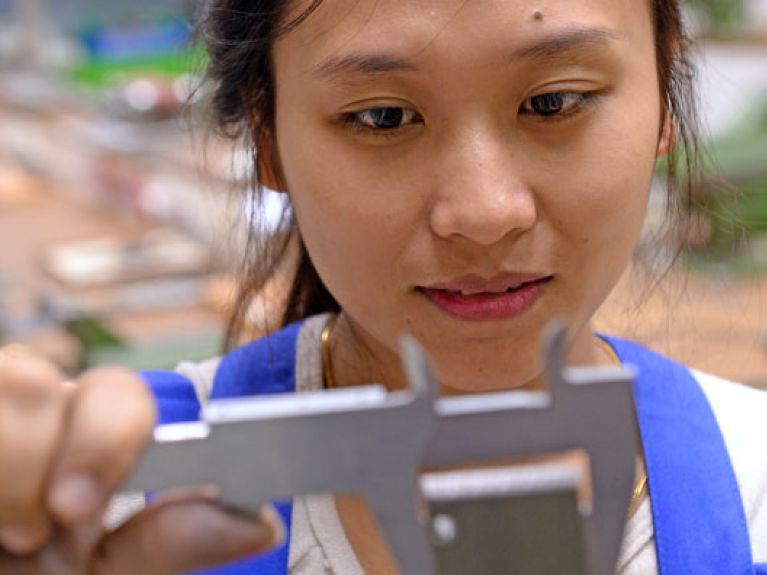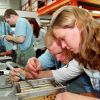Dual training is a successful model
The dual system of vocational training has proved an effective means of combating youth unemployment and skills shortages. Many countries would now like to introduce this model in partnership with Germany.

Vocational education “Made in Germany” is a successful export. Germany is already collaborating with over 100 countries that have an interest in the German system. Politicians, education managers, business executives and representatives of various organisations recently discussed how this cooperation can be strengthened further at a review conference in Berlin organised by the Federal Education Ministry, Federal Foreign Office, Federal Economics Ministry and the Federal Development Ministry.
For decades, Germany has had a highly successful dual vocational training system. Trainees gain practical skills working in a business while at the same time acquiring theoretical knowledge at a vocational school. This system of training has proved an effective instrument against not only youth unemployment, but also skills shortages. As a result, it has come to be regarded internationally as a successful model. The Federal Government presented a position paper in 2013 that declared Germany’s intention to make its expertise in dual vocational training available to interested partner countries. They can receive advice from education experts if they introduce a vocational education system based on the German model.
International cooperation in vocational education has many positive effects. Young people gain new prospects in their home country, and social harmony is strengthened in the countries involved because a supply of skilled specialists creates competitive advantages. “German industry is highly export-oriented with a special emphasis on mechanical engineering and high technology,” said Professor Maria Böhmer, Minister of State at the Federal Foreign Office. “When German businesses sell their products abroad, they need local specialists who can operate their machines.” A regulated system of vocational education would contribute to this. Böhmer also pointed out that education was a core element of sustainable development. Germany’s commitment in this area supports the goals of the United Nations 2030 Agenda for Sustainable Development.
Providing greater practical experience in Slovakia
Many countries do not have systematic vocational education. When businesses hire employees, they provide brief training. On the other hand, vocational education is available in other countries, but it is often too theoretical; there is a general lack of practical relevance. “The old system has a bad image because too little money was invested for many years,” said Dr Guido Glania, Executive Director of the German-Slovakian Chamber of Industry and Trade. It acts as a partner for organisations in Slovakia that introduce a new and practice-oriented system of vocational education.
Qualified specialists for Mexico
The German dual system of practical and theoretical training is also in demand on the other side of the Atlantic: Mexico’s car industry alone requires 400,000 additional skilled workers. Many other companies also need specialists. That is why Germany’s Ambassador Viktor Elbling described Mexico as an “industrialised country without skilled workers”. A round table of experts from industry and education was set up with financial and technical support from Germany. Its members are working to introduce the dual system of vocational education in Mexico. “Above all, small businesses had difficulty accepting the idea at first,” explained Viktor Elbling. Many were afraid that trainees would generate high costs and then later move to competing firms. The diplomat also pointed to positve results: “The young people develop more self-confidence as a result of their training. They gain the impression that they have learnt and achieved more than others of the same age.” One third of the trainees are women.
Technical training in South Africa
Some 600 German businesses secure roughly 100,000 jobs in South Africa. There, too, there is a shortage of well-trained skilled workers. “Although almost all the children in each year group start school, entrepreneurs report that the educational standard of school-leavers declines from year to year,” said Alois Schneider, Head of Division at the Federal Ministry for Economic Cooperation and Development. One of the reasons for this is that although teachers are paid for working in remote regions, they do not travel there to teach. Vocational education projects are not meant to remedy the situation. Above all, German support is used to train young people in technical occupations. Many of them specialise in renewable energies.
In its international vocational education cooperation, Germany places special emphasis on Africa. A Marshall Plan is intended to contribute to the peaceful development of the continent whose population will double by 2050. “Many young people have no prospects,” said Alois Schneider. Roughly 20 million new jobs need to be created every year. Vocational education projects with German participation represent a first step in the right direction. In Rwanda, a country not so long ago ravaged by civil war, young people train as cooks or farmers. This secures the future. “Many people who complete a dual vocational training then go on to set up their own businesses and create new jobs themselves,” Minister of State Maria Böhmer is convinced.
GOVET informiert weltweit
GOVET – short for the German Office for International Cooperation in Vocational Education and Training – was created by the Federal Government in 2013 as a central point of contact for international collaboration in this field. GOVET offers interested parties abroad information about the dual system of vocational education and training, a project database on German vocational education and training projects worldwide, as well as consulting and intermediary services.
More about German international vocational education and training projects
© www.deutschland.de

